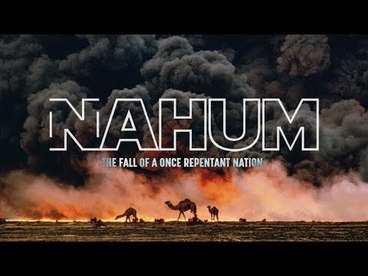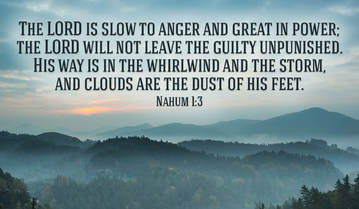
The English word prophet in the Old Testament comes from the Hebrew word “nabiy” which means “spokesman” or “speaker”. The Greek word for prophet is “prophētēs”, which can mean “one who speaks forth” or “advocate.” Prophets are also called “seers,” because of their spiritual insight or their ability to “see” the future, as directed by God.
Nahum
Nahum is a little known Prophet who prophesied about the coming end of the Assyrian Empire and the fall of their capital, Nineveh. The only mention of. Nahum is in the first verse of the book of Nahum
Nahum 1:1 NIV A prophecy concerning Nineveh. The book of the vision of Nahum the Elkoshite.
Nahum’s prophetic ministry took place between 663 and 612 BC.
The book mentions the fall of Thebes, which occurred in 663 BC:
Nahum 1:1, 3:8-10 NIV A prophecy concerning Nineveh. The book of the vision of Nahum the Elkoshite. Are you better than Thebes, situated on the Nile, with water around her? The river was her defense, the waters her wall. Cush and Egypt were her boundless strength; Put and Libya were among her allies. Yet she was taken captive and went into exile. Her infants were dashed to pieces at every street corner. Lots were cast for her nobles, and all her great men were put in chains.
And the destruction of Nineveh which happened in 612 BC
Nahum 1:1, 3:11-15 NIVnA prophecy concerning Nineveh. The book of the vision of Nahum the Elkoshite. You too will become drunk; you will go into hiding and seek refuge from the enemy. All your fortresses are like fig trees with their first ripe fruit; when they are shaken, the figs fall into the mouth of the eater. Look at your troops— they are all weaklings. The gates of your land are wide open to your enemies; fire has consumed the bars of your gates. Draw water for the siege, strengthen your defenses! Work the clay, tread the mortar, repair the brickwork! There the fire will consume you; the sword will cut you down— they will devour you like a swarm of locusts. Multiply like grasshoppers, multiply like locusts!
Nahum ministered during one of the darkest times of Judah's history before the Babylonian exile. He would have preached during the reign of King Manesseh, who was one of the most evil kings in Judah’s history.
2 Chronicles 33:1-6 NIV Manasseh was twelve years old when he became king, and he reigned in Jerusalem fifty-five years. He did evil in the eyes of the Lord , following the detestable practices of the nations the Lord had driven out before the Israelites. He rebuilt the high places his father Hezekiah had demolished; he also erected altars to the Baals and made Asherah poles. He bowed down to all the starry hosts and worshiped them. He built altars in the temple of the Lord , of which the Lord had said, “My Name will remain in Jerusalem forever.” In both courts of the temple of the Lord , he built altars to all the starry hosts. He sacrificed his children in the fire in the Valley of Ben Hinnom, practiced divination and witchcraft, sought omens, and consulted mediums and spiritists. He did much evil in the eyes of the Lord , arousing his anger.
Manasseh was captured and humiliated by the Assyrians. While in captivity he repented, prayed and God allowed him to be returned to his position as king.
2 Chronicles 33:10-13 NIV The Lord spoke to Manasseh and his people, but they paid no attention. So the Lord brought against them the army commanders of the king of Assyria, who took Manasseh prisoner, put a hook in his nose, bound him with bronze shackles and took him to Babylon. In his distress he sought the favor of the Lord his God and humbled himself greatly before the God of his ancestors. And when he prayed to him, the Lord was moved by his entreaty and listened to his plea; so he brought him back to Jerusalem and to his kingdom. Then Manasseh knew that the Lord is God.
Most of the Old Testament Prophets spoke of the disobedience, punishment, exile, and restoration of the kingdoms of Israel and Judah. Nahum, is one of three prophets who prophesied against countries that and afflicted Israel and Judah throughout their histories; Nahum against Assyria, Obadiah against Edom, and Habakkuk against Babylon.

Nahum’s focus on the impending judgment of Nineveh is a continuation of the story that began in Jonah, who prophesied 150 years earlier against Nineveh and experienced a great revival in the city.
Jonah 1:2, 3:3-10 NIV “Go to the great city of Nineveh and preach against it, because its wickedness has come up before me.”Jonah obeyed the word of the Lord and went to Nineveh. Now Nineveh was a very large city; it took three days to go through it. Jonah began by going a day’s journey into the city, proclaiming, “Forty more days and Nineveh will be overthrown.” The Ninevites believed God. A fast was proclaimed, and all of them, from the greatest to the least, put on sackcloth. When Jonah’s warning reached the king of Nineveh, he rose from his throne, took off his royal robes, covered himself with sackcloth and sat down in the dust. This is the proclamation he issued in Nineveh: “By the decree of the king and his nobles: Do not let people or animals, herds or flocks, taste anything; do not let them eat or drink. But let people and animals be covered with sackcloth. Let everyone call urgently on God. Let them give up their evil ways and their violence. Who knows? God may yet relent and with compassion turn from his fierce anger so that we will not perish.” When God saw what they did and how they turned from their evil ways, he relented and did not bring on them the destruction he had threatened.
Jonah 4:1-3 NIV But to Jonah this seemed very wrong, and he became angry. He prayed to the Lord , “Isn’t this what I said, Lord , when I was still at home? That is what I tried to forestall by fleeing to Tarshish. I knew that you are a gracious and compassionate God, slow to anger and abounding in love, a God who relents from sending calamity. Now, Lord , take away my life, for it is better for me to die than to live.”
During the time of Nahum, the Assyrians had returned to their previous ways, conquering the northern kingdom of Israel and exacting tribute and threatening Judah. It seems that Nineveh has now fallen again into is severe sin and is being told again of certain judgment. This was the reason Jonah didn't want to warn Assyria in the first place.
Now Nahum was telling the people of Judah to not despair because God had pronounced judgment and the Assyrians would soon be getting just what they deserved. Nahum, thru his prophecies reminded the people of Judah that God’s justice is always right and always sure. He will grant mercy for a time, but He will never compromise justice for all in the end.
What We Learn From Nahum
After allowing approximately two hundred years of powerful Assyrian kings and rulers, God announced through Nahum His plans to judge the city of Nineveh. While the book as a whole clearly shows God’s concern over sin, His willingness to punish those guilty of wickedness, and His power to carry out His desire for judgment, it also contains rays of hope shining through the darkness. Most significant, the people of Judah would have immediately taken hope in the idea that Nineveh, their primary oppressor for generations, would soon come under judgment from God. Also, a small but faithful remnant in an increasingly idolatrous Judah would have been comforted by declarations of;
God’s slowness to anger
Nahum 1:3 NIV The Lord is slow to anger but great in power; the Lord will not leave the guilty unpunished. His way is in the whirlwind and the storm, and clouds are the dust of his feet.
His goodness and strength
Nahum 1:7 NIV The Lord is good, a refuge in times of trouble. He cares for those who trust in him,
And His restorative power
Nahum 2:2 NIV The Lord will restore the splendor of Jacob like the splendor of Israel, though destroyers have laid them waste and have ruined their vines.
Paul repeats Nahum in Romans.
Romans 10:15 NIV And how can anyone preach unless they are sent? As it is written: “How beautiful are the feet of those who bring good news!”
Nahum 1:15 NIV Look, there on the mountains, the feet of one who brings good news, who proclaims peace! Celebrate your festivals, Judah, and fulfill your vows. No more will the wicked invade you; they will be completely destroyed. (emphasis mine)
The prophet Nahum reminds us of God’s active hand, working even in the darkest of times to bring justice and hope throughout the world.

 RSS Feed
RSS Feed